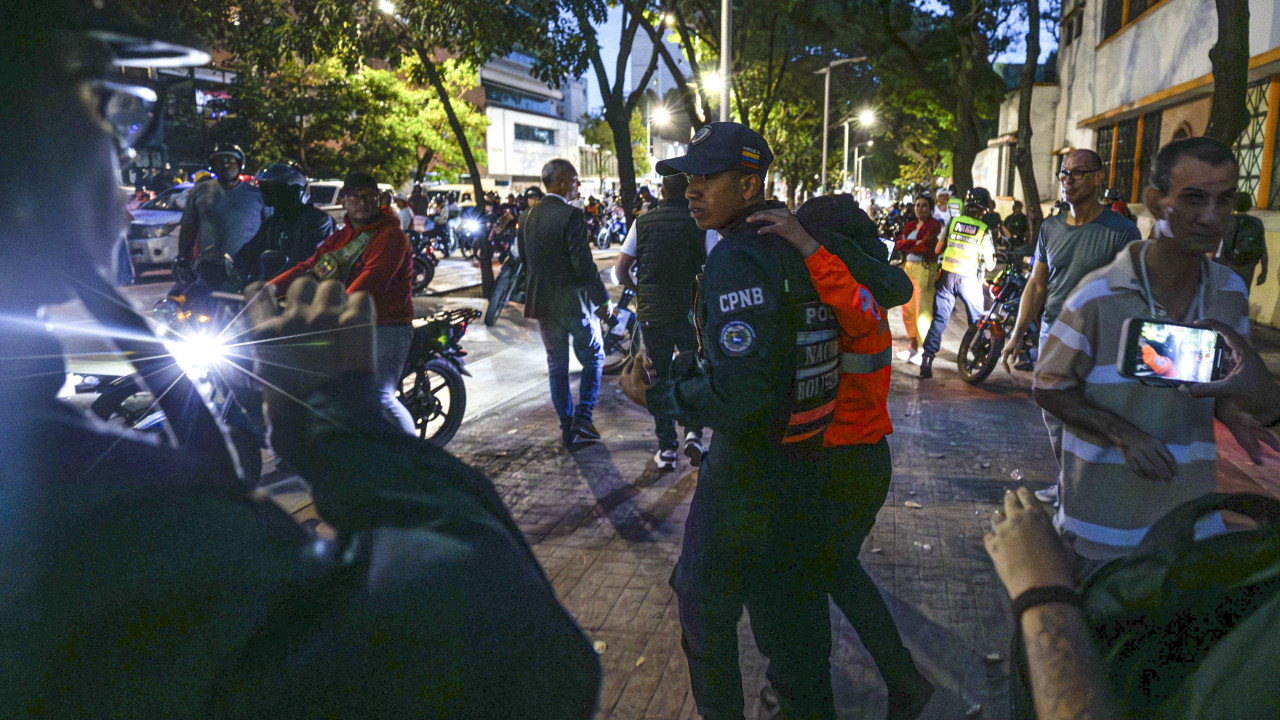
OProtests began in several regions of the interior of the country, including the state of Falcón, where in the Plaza Chávez de Las Eugénias, dozens of protesters were trying to topple a statue of the late socialist leader, Hugo Chávez, who presided over the country between 1999 and 2013.
In La Isabelica, Valencia, Carabobo State (central-north of the country), hundreds of people, including dozens of motorcyclists, took to the streets to protest against the results.
On the highway that connects Caracas to the neighboring state of La Guaira (north), locals set tires on fire, preventing traffic.
On the other hand, in the eastern part of the city of Caracas, in the poor neighborhood of Petare, considered the largest in Latin America, several people, some of them hooded, took to the streets shouting slogans against Nicolás Maduro, having destroyed some of his campaign posters.
Hundreds of protesters, on foot and on motorbikes, went from the centre of Petare to the CNE warehouses in Mariche, shouting and chanting “it will fall. This government will fall” and “we will go until the end”, the protesters shouted.
Still in Caracas, in the poor neighborhood of El Cementério, protesters expelled several officers of the Bolivarian National Guard (PNB, military police) from the site, while shouting “cowards (…) did not come out to defend the country”.
Despite the rain, in Los Teques (30 kilometers south of Caracas), hundreds of people marched in protest from Avenida Independencia to La Matica, in rejection of the election results.
Meanwhile, in Maracaibo, in the western state of Zulia, security forces dispersed several protesters with tear gas, according to videos posted on social media.
In Aragua, 100 kilometers from Caracas, hundreds of people gathered near the Libertador Air Base
As the demonstrations progress and the protesters walk through the streets, as they approach the pieces, they play pots and vuvuzelas from the windows in support.
The protests took place after Venezuela’s Attorney General, Tareck William Saab, warned that citizens accused of violence or who reject the results announced by the CNE that gave Nicolás Maduro victory “could be punished with prison sentences”.
“We warn that acts of violence and appeals may be classified as crimes of public incitement. With a sentence of three to six years in prison,” he said in a speech broadcast on local television.
Tareck William Saab also explained that the Venezuelan Public Prosecutor’s Office has opened an investigation against opponents María Corina Machado, Leopoldo López and Lester Toledo, for alleged involvement in an attack against the CNE’s data transmission system that would have the purpose of altering the results of the presidential elections.
Venezuela’s National Electoral Council (CNE) announced that outgoing President Nicolás Maduro was re-elected for a third consecutive term with 51.20% of the vote.
Maduro obtained 5.15 million votes, ahead of opposition candidate Edmundo Gonzalez Urrutia, who obtained just under 4.5 million (44.2%), according to official figures announced by CNE president Elvis Amoroso.
The Venezuelan opposition claims victory in Sunday’s presidential election, with 70 percent of the vote going to the opposition candidate. Edmundo González Urrutia won 70 percent of the vote, opposition leader María Corina Machado said, refusing to recognize the results proclaimed by the CNE.
Read Also: Who is Nicolás Maduro, the “workers’ president” supported by the military?
Download our free App.
Eighth consecutive year Consumer Choice for Online Press and elected product of the year 2024.
* Study by Netsonda, Nov. and Dec. 2023 productoftheyear- pt.com
Source: https://www.noticiasaominuto.com/mundo/2606831/governo-vai-cair-venezuelanos-rejeitam-nas-ruas-resultados-eleitorais



